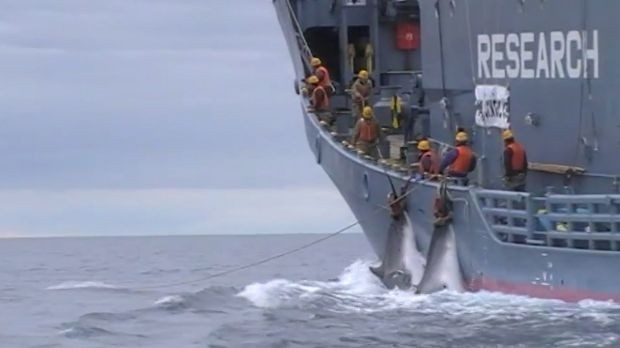Shocking Japanese whaling video shows barbaric hunt in Australian whale sanctuary
The shocking footage shows the fishermen using harpoons to drag the whales on board their vessel.
A graphic video of Japanese fishermen hunting whales in an Australian ocean sanctuary in the Antarctic region has finally been released, nearly a decade after it was caught on camera and after five years of legal battle.
The footage released by Sea Shepherd conservation group shows the men using a harpoon on a whale before dragging its injured body on to their boat.
The video was filmed by Australian Customs personnel in 2008, but its release was suppressed by the government over diplomatic concerns. NSW Environmental Defender's Office filed an urgent Freedom of Information application on behalf of Humane Society International in 2012 calling for the video's release.
Two applications were denied when the government claimed the footage was being used as part of international legal action against Japanese whaling. The Department of Immigration and Border Protection dismissed a third application citing the release of the video would "affect international relations" with Tokyo.
In May, the Information Commissioner overturned the order and instructed the government to release the footage.
"You see minke whales swimming at 16, 17 knots to try and outrun these harpoon ships, before being hit with an explosive harpoon that sends shrapnel through their bodies," Jeff Hansen, managing director of Sea Shepherd, said explaining Japanese whaling techniques.
"Hooks come out, and they dive deep, you can see them diving to try and get away from this cable which they're attached to and they're slowly dragged back to the surface, before they're met with the gunner on the harpoon ship who then shoots them.
"They take a long time to die before dying in a sea of their own blood," he said of the harrowing video.
The Japanese vessel had claimed to be a research ship and a spokesperson for the country's embassy said the programme was carried out "in accordance with the International Convention for Regulation of Whaling".























